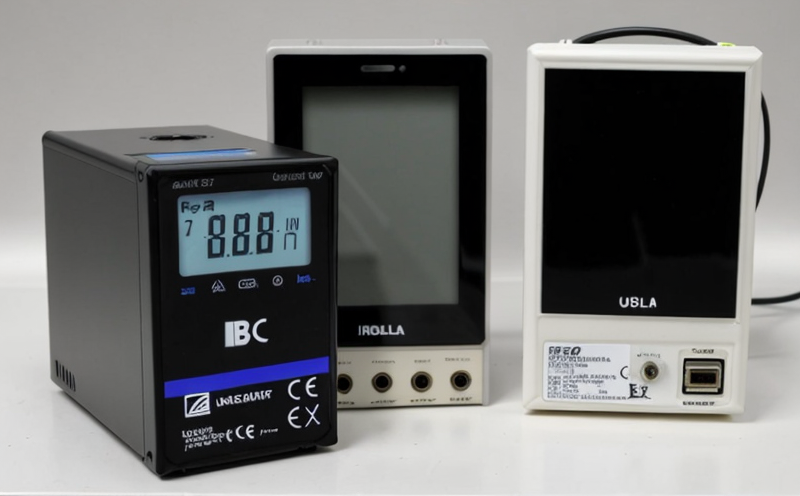UL 1973 Consumer Electronics Stationary Power Supply Battery Testing
The UL 1973 standard is a critical benchmark for ensuring the safety and performance of stationary power supply batteries used in consumer electronics. This rigorous testing protocol ensures that batteries meet stringent safety requirements, providing peace of mind to manufacturers and consumers alike. Compliance with this standard not only enhances product reliability but also helps companies avoid potential recalls and legal issues.
Battery failures can lead to significant risks such as overheating, short circuits, or even explosions, which are particularly concerning in consumer electronics where batteries may be exposed to various environmental conditions like heat stress, overcharge, and mechanical abuse. UL 1973 addresses these hazards by simulating real-world scenarios that a battery might encounter during its lifecycle.
The testing protocol includes several key procedures designed to evaluate the safety, durability, and performance of stationary power supply batteries in consumer electronics. These tests are conducted under controlled conditions to replicate potential abuse cases, ensuring that the battery maintains its integrity and functionality even when subjected to extreme conditions.
Compliance with UL 1973 is mandatory for manufacturers looking to enter regulated markets or ensure their products meet specific safety requirements. The standard covers a wide range of stationary power supply batteries used in various consumer electronics devices, such as laptops, smartphones, tablets, and other portable electronic gadgets.
The testing process begins with initial inspections to identify any visible defects that could compromise the battery's performance. Following this, the batteries undergo a series of tests aimed at assessing their safety under different conditions. These include thermal cycling, vibration testing, altitude simulation, and overcharge/overdischarge abuse tests. Each test is designed to simulate real-world usage scenarios, ensuring that the battery can withstand common stresses without failing.
Thermal cycling tests expose batteries to a range of temperatures from extreme cold to high heat, mimicking environmental conditions encountered during transport or storage. Vibration testing evaluates how well the battery withstands mechanical stress, which is crucial for portable devices used in various environments. Altitude simulation tests assess the battery's performance at different altitudes, ensuring it functions correctly under varying atmospheric pressures.
Overcharge/overdischarge abuse tests are particularly critical as they evaluate the battery's ability to handle unusual conditions that may arise during use or charging processes. These tests help ensure that the battery does not pose a fire hazard or other risks even if subjected to extreme charging scenarios. Additionally, the tests provide insights into the battery's lifespan and durability, which is essential for manufacturers aiming to improve product longevity.
Once all tests are completed, detailed reports are generated summarizing the results of each test procedure. These reports serve as a comprehensive overview of the battery's performance under various conditions, highlighting any areas where improvements can be made. The report also provides recommendations for enhancing safety and reliability based on the findings from the testing process.
Compliance with UL 1973 not only ensures that batteries meet strict safety standards but also helps manufacturers build a strong brand reputation by demonstrating their commitment to quality and safety. This compliance can lead to increased market confidence, enhanced product performance, and improved customer satisfaction. Furthermore, it provides a competitive advantage in the marketplace, allowing companies to differentiate themselves from competitors who may not adhere to such stringent testing protocols.
By adhering to UL 1973 standards, manufacturers can ensure that their products meet international safety requirements while also enhancing overall product quality and reliability. This commitment to safety and performance helps foster trust among consumers and regulatory bodies, ultimately contributing to long-term success in the consumer electronics market.
Benefits
Ensures compliance with international safety requirements for stationary power supply batteries used in consumer electronics.
Enhances product reliability and performance, reducing the risk of failures or malfunctions during use.
Maintains high standards of quality, ensuring that products meet the expectations of consumers and regulatory bodies alike.
Avoids potential recalls and legal issues associated with battery-related incidents such as overheating or explosions.
Builds a strong brand reputation by demonstrating a commitment to safety and performance.
Provides valuable insights into the battery's lifespan and durability, helping manufacturers improve product longevity.
Quality and Reliability Assurance
The UL 1973 testing protocol is designed to provide comprehensive quality assurance for stationary power supply batteries used in consumer electronics. By subjecting batteries to a wide range of tests, manufacturers can identify any potential weaknesses or areas for improvement before products reach the market.
This rigorous approach helps ensure that only safe and reliable batteries are available to consumers, fostering trust and confidence in both the manufacturer and the product itself. The testing process not only enhances the overall quality of the battery but also provides valuable data that can be used to refine future designs and manufacturing processes.
Through adherence to UL 1973 standards, manufacturers can demonstrate their commitment to excellence in safety and performance, which is crucial for maintaining a strong market presence. This commitment to quality and reliability can set products apart from competitors, giving them a competitive edge in an increasingly demanding industry.
Competitive Advantage and Market Impact
Compliance with UL 1973 standards provides manufacturers with a significant competitive advantage in the consumer electronics market. By ensuring that their products meet strict safety and performance requirements, companies can differentiate themselves from competitors who may not adhere to such stringent testing protocols.
This commitment to quality and reliability can lead to increased market confidence, enhanced product performance, and improved customer satisfaction. In an era where trust is paramount, adhering to UL 1973 standards helps manufacturers build a strong brand reputation that resonates with consumers.
Moreover, compliance with this standard can also open up new market opportunities for companies seeking to enter regulated markets or ensure their products meet specific safety requirements. By demonstrating their commitment to excellence in safety and performance, manufacturers can position themselves as leaders in the industry, attracting both domestic and international customers.





